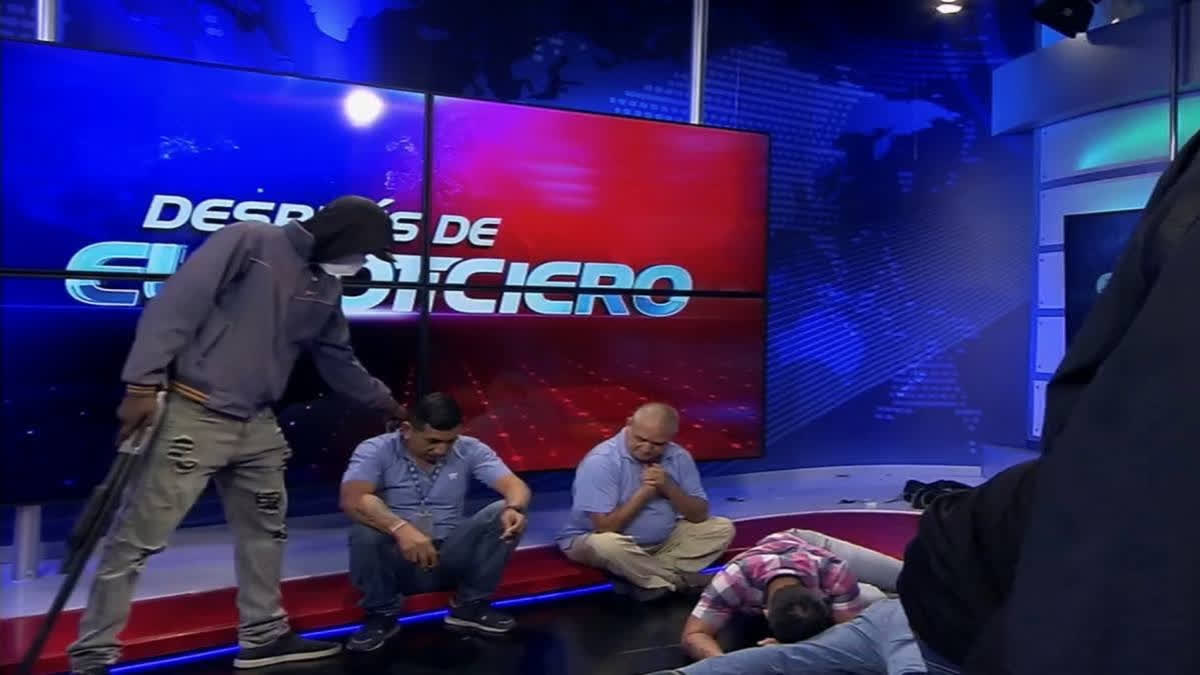Ecuador: Schools and stores sat shuttered, many people stayed home and soldiers roamed the streets of Ecuador’s biggest cities Wednesday, the day after armed men invaded a television station’s live afternoon newscast and the president told the security forces to wipe out the drug gangs terrorizing the country.
The group wielding explosives and guns flashed across the televisions of Ecuadorians for 15 minutes on Tuesday as the intruders threatened and assaulted employees of the TC Televisión network’s station in the city of Guayaquil. No one was killed and 13 suspects were arrested, but the violent broadcast stunned much of the region — and elicited a wide-ranging government response.
President Daniel Noboa issued a decree saying his country was in an “internal armed conflict” and designated 20 drug-trafficking gangs as terrorist groups that the military had authorization to “neutralize” within the bounds of international humanitarian law.
“We are in a state of war and we cannot give in,” Noboa said during an interview with Radio Canela on Wednesday.
He’d already declared a national state of emergency Monday after the leader of one of Ecuador’s most powerful drug gangs disappeared from prison. Since Adolfo Macías’ apparent escape, Ecuador has seen police officers kidnapped and at least 125 corrections personnel taken hostage inside prisons.
The government said nearly 330 people, including the TC Televisión suspects, had been arrested for alleged acts of terrorism as of Wednesday afternoon. Security forces across Ecuador guarded hospitals, public transit and newsrooms. The government ordered teachers and students to hold classes remotely until Friday.
In the radio interview, Noboa promised to crack down on drug trafficking groups and consolidate peace in the Andean nation of 18 million.
“We are fighting against terrorist groups made up of more than 20,000 people,” Noboa said. “They wanted to be named as organized crime groups ... but they are terrorists.”
The president warned that judges, prosecutors and officials who collaborated with the gangs would be considered part of a terrorist network.
Even in a country where a presidential candidate was assassinated last year, the show of force streamed into Ecuadorians’ homes and workplaces was unprecedented. The motive for targeting the station remained unclear.
“We are on air, so you know that you cannot mess with the mafia,” one of the assailants said during the broadcast attack. The words sounded like a warning addressed to Ecuadorian authorities and the nation at large.
Noboa’s resolve was welcome to many Ecuadorians, who have watched their nation descend into chaos. While wedged between major cocaine producers Colombia and Peru, Ecuador has been comparatively peaceful. But traffickers tired of doing business in more militarized countries have set up shop there.
Humberto Poggi del Salto, 50, a businessman in Guayaquil, urged the government to come down on the armed groups with “a firmer hand, to have no mercy, no tolerance or (respect for) the human rights of criminals.”
“President Noboa must do what El Salvador did,” he said. “The situation has gotten out of control. And it is because of lack of extreme measures.”
El Salvador’s president, Nayib Bukele, two years ago suspended constitutional rights to wage an all-out war on violent gangs. Sharp declines in criminal violence since then have made the 42-year-old leader highly popular at home and across Latin America.
Read more



